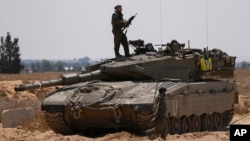The White House expressed hope Tuesday that Israel and Hamas could close any gaps in cease-fire negotiations, as Israel warned it could "deepen" its operation in the southern Gaza city of Rafah if talks fail to secure the release of hostages.
"A close assessment of the two sides' positions suggests that they should be able to close the remaining gaps, and we're going to do everything we can to support that process," National Security Council spokesman John Kirby said.
Israel’s military said Tuesday its forces had taken control of the Gaza side of the Rafah crossing between the Gaza Strip and Egypt, a day after ordering tens of thousands of Palestinians to leave the area and launching repeated airstrikes.
The Israeli operation comes after weeks of Israeli officials saying an offensive in Rafah was necessary to achieve their goal of defeating Hamas, while the United States, the United Nations and others warned that launching an offensive in an area crowded with Palestinian civilians could create a humanitarian disaster.
Kirby said Israeli officials have indicated the operation was limited in scope.
But Israeli Defense Minister Yoav Gallant warned of more extensive operations in Rafah unless cease-fire talks taking place in Cairo result in the release of hostages held by Hamas.
U.N. Secretary-General Antonio Guterres said an assault on Rafah would be a “strategic mistake, a political calamity, and a humanitarian nightmare” at a time when famine is looming over northern Gaza.
“It would be tragic if weeks of intense diplomatic activity for peace in Gaza yields no cease-fire, no release of hostages, and a devastating offensive in Rafah,” he told reporters at the United Nations.
He urged both the Israeli government and Hamas to show “the political courage” to secure a deal and stop the bloodshed, and urged countries with influence over the parties to use it.
He said the two main aid crossings into Gaza — Rafah and Kerem Shalom — must be reopened immediately.
Jordan’s foreign minister said on social media platform X that instead of giving negotiations a chance, Israel occupied the Rafah crossing and closed it to humanitarian aid. He called for the U.N. Security Council to “act firmly & immediately.” And he called for Israeli Prime Minister Benjamin Netanyahu to “face real consequences.”
Israeli Foreign Minister Israel Katz posted on social media that Israel’s move into Rafah is about achieving its main goals, including the release of the hostages held by Hamas and the militant group’s defeat.
The developments in Rafah followed a Hamas announcement Monday that it had accepted a cease-fire proposal worked out with Egyptian and Qatari negotiators.
Israeli Prime Minister Netanyahu’s office said the cease-fire proposal was “far from Israel’s essential demands,” but that Israel would send negotiators to Cairo on Tuesday to continue talks.
Israeli officials told media outlets that the plan approved by Hamas was not what Israel had agreed to, but was unclear what, if anything, had changed about the proposal that Hamas would accept but Israel would not.
During the past week, efforts to secure a cease-fire have intensified, including U.S. Secretary of State Antony Blinken’s visit to the region. He has repeatedly urged Hamas to accept the proposal, saying Israel has made compromises.
The status of the cease-fire negotiations appeared unlikely to affect Israel’s plans to move into Rafah, with Netanyahu saying last week that a Rafah operation would happen whether or not there was a cease-fire deal.
Netanyahu’s office said Monday the Israeli War Cabinet “unanimously decided that Israel continue the operation in Rafah to exert military pressure on Hamas in order to advance the release of our hostages and the other goals of the war.”
U.S. President Joe Biden spoke with Netanyahu by telephone Monday, reiterating the U.S. position that a Rafah operation must include a plan for keeping Palestinian civilians safe.
A White House statement said that Netanyahu agreed "to ensure the Kerem Shalom crossing is open for humanitarian assistance for those in need.”
The World Health Organization says about 1.2 million people are sheltering in Rafah — more than half of them children. Many came from other parts of Gaza, fleeing in search of safety and shelter as Israel’s campaign against Hamas left much of the Gaza Strip in ruins.
UNICEF: 'Nowhere safe to go' for 600,000 children in Rafah
The Israel-Hamas war was triggered by the October 7 Hamas terror attack on southern Israel that killed 1,200 people and led to the capture of about 250 hostages, according to Israeli officials. About 100 of the hostages were freed in a weeklong truce in late November.
Israel’s counteroffensive in Gaza has killed more than 34,700 Palestinians, about two-thirds of them women and children, according to the Hamas-run health ministry.
VOA’s Margaret Besheer contributed to this report. Some information came from The Associated Press, Agence France-Presse and Reuters.





Forum